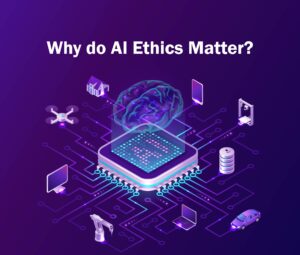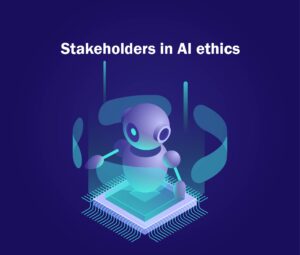Artificial intelligence (AI) is not just a concept from science fiction anymore, it is a well-established technology that has been developed over decades. Many brands have already been using AI in marketing to boost efficiency.
However, the excitement about the technology is followed by ethical concerns about AI. The tech industry’s vision for the metaverse bears similarities to dystopian portrayals in media like Black Mirror and Snow Crash. With works such as Parable of the Sower, Ex Machina, and I, Robot in the cultural conversation, it’s understandable why both sci-fi enthusiasts and experts emphasize the importance of outlining AI ethics.
Let’s talk more about the ethics of AI in this ultimate guide covering every aspect of this crucial term.
What is AI Ethics?
AI ethics entails a set of moral guidelines and professional methods that are employed to conscientiously guide the advancement and repercussions of artificial intelligence technology. It also encompasses the examination of strategies for enhancing its influence and mitigating any potential risks or adverse effects.
Prominent technology corporations, governmental bodies such as the United Nations, and research and data science communities have collaborated to formulate and release ethical guidelines. A notable example is UNESCO, which, in November 2021, established the world’s first comprehensive AI ethics standard known as “The Recommendation on the Ethics of Artificial Intelligence“.
As AI and other emerging technologies continue to advance, businesses should anticipate additional government regulations despite the existing AI regulations at the national and international levels. The integration of AI into our daily lives emphasizes the significance of the ethics of AI technologies and its role in digital literacy.
Why do AI Ethics Matter?
 Many companies are currently making investments in AI; however, the challenge lies in guaranteeing its responsible use.
Many companies are currently making investments in AI; however, the challenge lies in guaranteeing its responsible use.
The 2023 State of Social Media: AI and Data Take Center Stage report projects that there will be a surge in investments in AI in the coming years, as acknowledged by business leaders. The report further reveals that an overwhelming 98% of business leaders agree on the necessity for companies to have a deeper understanding of the immense potential of AI and machine learning (ML) technology in order to achieve long-term success.
In this report, business leaders’ predictions on investments in AI and ML technologies over the next three years are shown in data visualization. Leaders anticipate increased investment by 87%.
While AI can enhance performance, increase efficiency, and produce favorable business outcomes, brands are also encountering unexpected effects of its deployment. This may result from incomplete research or biased datasets, among other things. Misuse of AI or disregard for ethical considerations can have negative effects on a brand’s reputation through failure of products, lawsuits, and regulatory challenges.
Understanding the challenges faced by marketers is the first step in sustaining ethical standards across teams within your organization. Only then you can create a strategy to reduce these business risks and protect your brand.
Stakeholders in AI ethics
 Industry players must collaborate to set the standards for ethical AI use and development. Stakeholders must take into account how social, economic, and political challenges are related to AI and work to find a peaceful coexistence between humans and machines.
Industry players must collaborate to set the standards for ethical AI use and development. Stakeholders must take into account how social, economic, and political challenges are related to AI and work to find a peaceful coexistence between humans and machines.
Each of these factors is crucial in ensuring that AI technologies are less biased and risky.
● Academics
Professionals in the field, such as researchers and professors, have the crucial role of creating statistical theories, conducting research, and generating insightful ideas that can be utilized by governments, corporations, and non-profit organizations.
● Government
Government bodies and committees play a pivotal role in championing AI ethics within a nation. The Preparing for the Future of Artificial Intelligence report, initiated by the National Science and Technology Council (NSTC) back in 2016, outlines AI’s implications for public engagement, regulation, governance, economy, and security.
● Intergovernmental Entities
Global organizations such as the United Nations and the World Bank play a pivotal role in advocating and formulating international agreements on AI ethics. Notably, UNESCO’s 193 member states unanimously endorsed the inaugural global accord on the Ethics of AI in November 2021, emphasizing the preservation of human rights and dignity.
● Non-profit Organizations
Non-governmental organizations such as Black in AI and Queer in AI play a vital role in promoting inclusivity and diversity within the field of AI. Additionally, the Asilomar AI Principles, developed by the Future of Life Institute, provide comprehensive guidelines that highlight the potential risks, challenges, and desired outcomes associated with AI technologies.
● Private Companies
Executives in the tech industry, such as Google and Meta, as well as those in banking, consulting, healthcare, and other sectors that utilize AI technology, have the responsibility of establishing ethics teams and formulating codes of conduct. This practice often establishes a precedent for other companies to emulate.
Concluding Thoughts
AI ethics encompasses various principles and considerations aimed at ensuring the ethical and responsible development, implementation, and utilization of AI technology. It is imperative for policymakers to prioritize ethics in AI technology use and establish guidelines to address ethical concerns. By upholding moral standards, not only can we maximize the positive impact of AI technologies on society, but we can also mitigate negative effects, foster trust, encourage responsible innovation, ensure long-term sustainability, and make substantial contributions to society.





